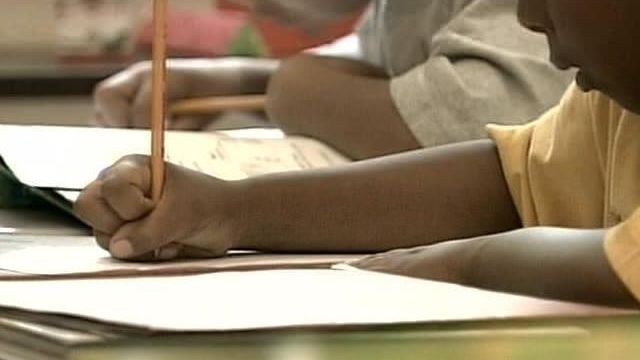Budget deal would cut thousands of teaching jobs
Thousands of North Carolina teachers and teaching assistants would lose their jobs in the next two years under a budget compromise discussed Monday by state lawmakers.
Posted — UpdatedBudget negotiators from the House and Senate have been working for the past week on a two-year spending plan that erases a projected $4.6 billion deficit. Lawmakers are trying to approve a budget before the new fiscal year starts July 1.
Education committees on Monday looked at a deal to cut more than $390 million in classroom spending.
Under the plan, Senators would accede to House demands to maintain current class sizes in kindergarten through the third grade. Third-grade teaching assistants would be eliminated in the proposal, saving $130 million while costing 4,500 jobs.
In return, House negotiators agreed to the Senate's plan to increase class sizes in grades four through 12. The phased-in approach would add two students to each class in the coming school year and a third student to each class in 2010-11.
Larger classes mean fewer teachers are needed. About 3,400 teachers would lose their jobs in the first year of the proposal, saving $183 million. Another 1,500 teaching positions would be eliminated in the second year, saving another $80 million.
Other proposed cuts include $30 million to the More at Four pre-kindergarten program over two years, $10 million from school support personnel and $38 million in improving student accountability.
Gov. Beverly Perdue has been barnstorming the state in recent days trying to rally support for higher taxes to avoid such drastic cuts to education.
"I've been so troubled by the proposed cuts to public education," Perdue said last Wednesday in Raleigh. "We cannot increase class size. We cannot lay off teachers. We will not sacrifice North Carolina's economic future."
She has called on lawmakers to raise $1 billion to $1.5 billion in new revenue each year that could be funneled back into spending in North Carolina's public schools, community colleges and universities.
The House and Senate have unveiled markedly different plans for raising the money – the House wants to raise sales and income taxes, while the Senate wants taxes on various services and higher cigarette and alcohol taxes – so it's unclear whether they will reach a compromise.
If lawmakers can agree on a plan for raising the revenue, some of the education cuts under consideration might be dropped.
"We could really make some serious adjustments in terms of class sizes (and) in terms of programs at the universities, and it would be a major boost," Rep Ray Rapp, D-Haywood, said of having some extra revenue in the budget.
"The serious problem the governor has, which is the problem the (legislative) leadership has, is where are you going to get the votes to increase the taxes you're talking about to get to $1.5 billion," Rapp said.
Negotiators have agreed on about 95 percent of education cuts. They still have to discuss potential jobs cuts at the state Department of Public Instruction, whether to allow out-of-state athletes in the University of North Carolina system to pay in-state tuition and higher education tuition increases.
The House wants to raise tuition at UNC campuses and community colleges by $200 or 8 percent, whichever is lower, while the Senate wants to offer campuses more flexibility in raising tuition.
• Credits
Copyright 2024 by Capitol Broadcasting Company. All rights reserved. This material may not be published, broadcast, rewritten or redistributed.






